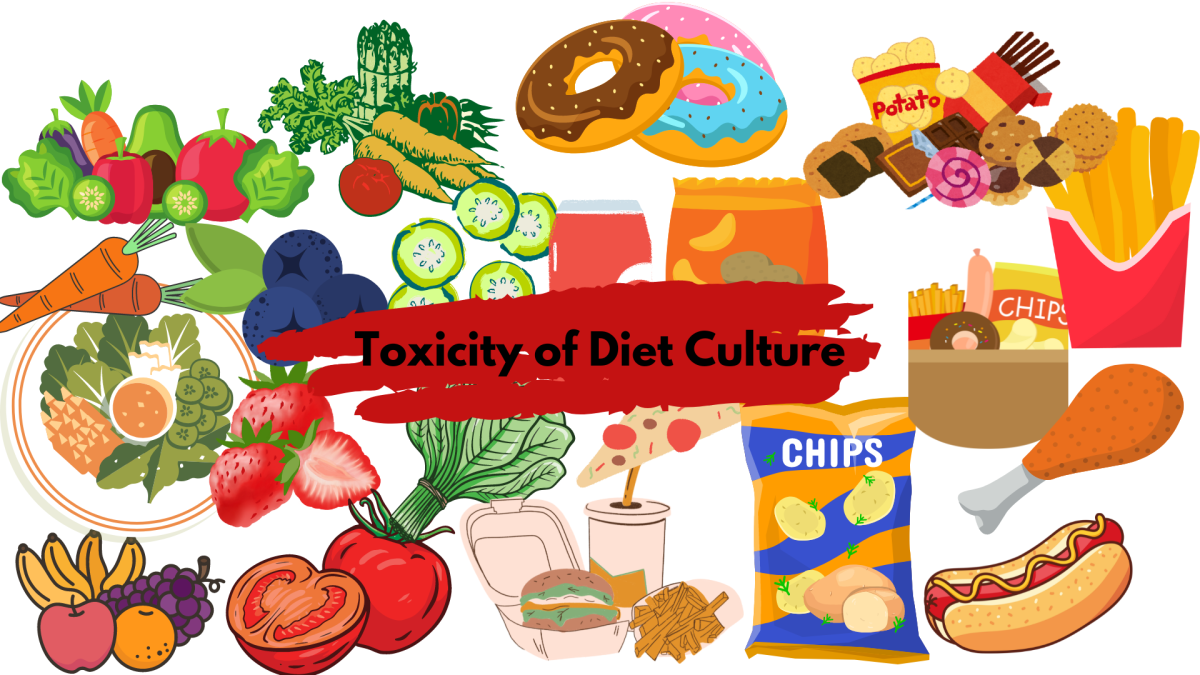The Truth about Diet Habits
Diets have consistently proven ineffective and unsuccessful, causing many people to fall into weight cycling– fluctuations in weight caused by diet programs. 98% of diets fail, yet 100% of dieters believe they will be a part of the 2%. Diet programs only focus on short-term weight loss, yet the dieters typically cannot keep up with these restrictive diets causing them to regain all the lost weight. Long-term weight cycling can also lead to serious health consequences such as cardiovascular disease and Type 2 diabetes. These continuous failed diets can also result in poor mental health effects causing eating disorders and a negative body image or body dysmorphia. According to the Mayo Clinic, body dysmorphic disorder is a mental health condition in which one continually thinks about the perceived flaws in their appearance.
Another hidden truth behind diet culture is that it can result in an unhealthy view of exercise and fitness. Dieters often view exercise as a punishment for failing to reach their weight goals, resulting in them viewing fitness in a negative light and eliminating the possibility of enjoyment and personal goals while working out.
What is Diet Culture?
In simple terms, diet culture argues that one’s physique and body image hold more importance than one’s mental and physical well-being. Diet culture is the belief that controlling one’s weight, specifically by dieting, should be normalized. Diet culture worships thinness and focuses on body image instead of focusing on health and wellness.
Diet Culture Currently
With the rise of social media usage and entertainment programs, our society has easily communicated ideas with one another. This positive development allows communication, connection, and positive influencing. However, the media has also incurred unhealthy influences, specifically by promoting diet culture.
Huntington Beach High School junior Kailea Haver noted the media’s profound influence on diet culture. Haver said, “l always see weight loss videos on TikTok and Instagram so I understand why so many people struggle with their body image.”
One instance of the media’s impact on diet culture is depicted through Kim Kardashian’s shapewear brand SKIMS. Kardashian promotes that women should squeeze into tight shapewear underneath clothing to appear thinner. These harmful expectations can result in poor body image with her fans feeling the need to appear thinner, which can lead to them falling into diet culture.
Additionally, phrases such as “Freshman 15” have instilled fear of weight gain into college students. “Freshman 15” refers to the 15-pound weight gain many incoming college students experience. This expression has caused unhealthy eating habits in college students that could worsen and progress into disordered eating.
Navigating Diet Culture
After understanding the impact of diet culture, one may ask themselves, how can I resist diet culture? There are many methods one can use to avoid diet culture and live a healthy lifestyle. One method gaining recognition on social media platforms currently is Intuitive Eating. Intuitive eating focuses on restraining from labeling foods as “good” or “bad.” Instead, Intuitive Eating focuses on eating what feels right to you and listening to one’s body.
Allis Francis wrote an article regarding her experience with Intuitive Eating, titled, “I Thought Intuitive Eating Was Just Another Diet–Until I Tried It.” Throughout the article, she explains her journey with Intuitive Eating, she said “I noticed a shift my feelings around food. Not only did my anxiety disappear over deciding what to eat when everything was fair game, I was living more intuitively too.”
Other various methods one could use to avoid diet culture include:
- Refraining from focusing on weight loss when exercising, think of exercises as beneficial for your health
- Avoiding content on social media that promotes diet culture
- Reaching out to loved ones for support
- Get rid of scales
- Educating oneself on what health really is
- Reminding oneself that being overweight does not equate to an unhealthy lifestyle, thinness and health are not synonyms.
Now you are ready to navigate diet culture and avoid falling into unhealthy habits. If body positivity and good eating habits are difficult for you, refer to the methods on this list or reach out to a professional for help.








